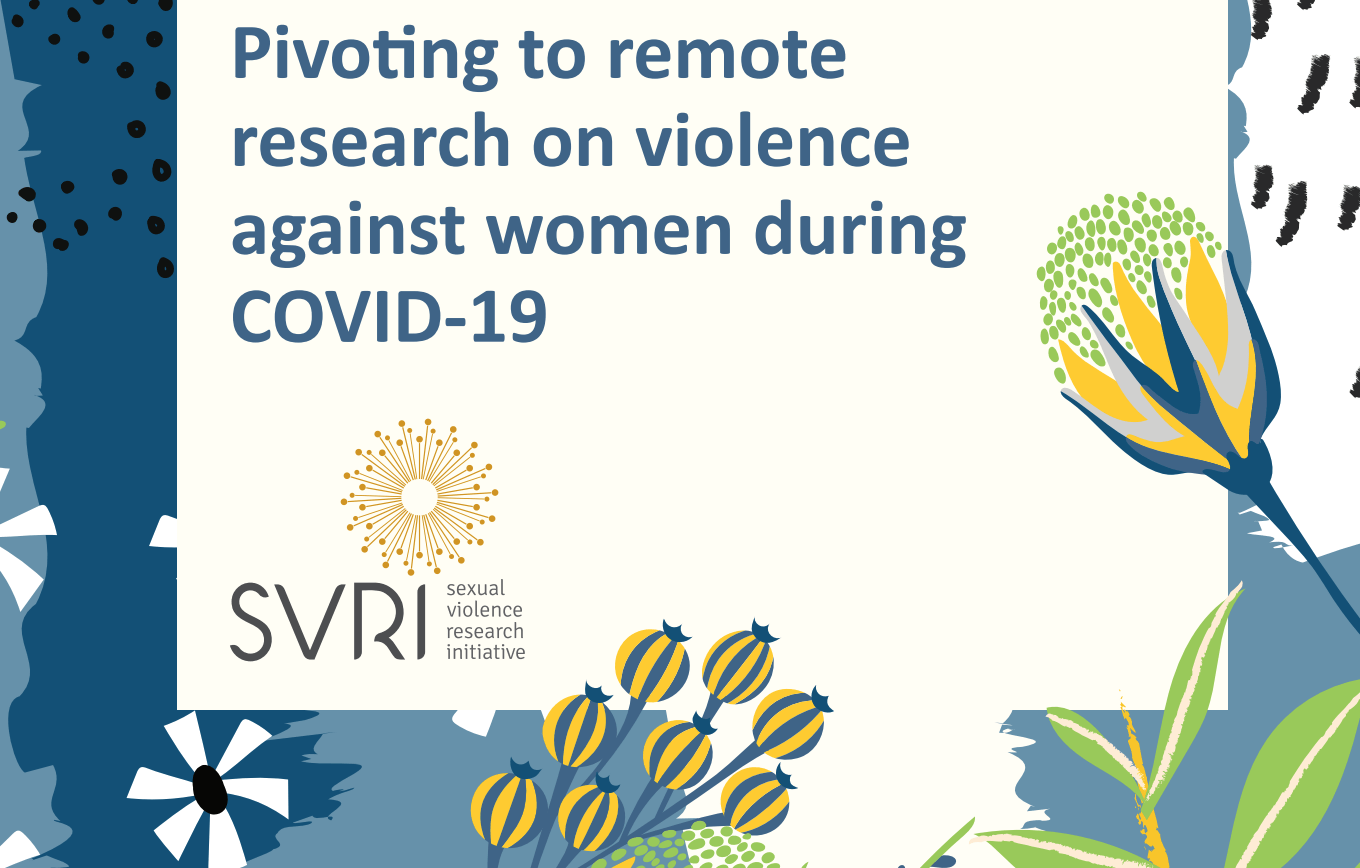kNOwVAWdata contributed to the Sexual Violence Research Initiative's new publication, Pivoting to remote research on violence against women during COVID-19. This resource describes the challenges of safely measuring violence against women during the COVID-19 pandemic when conditions of restricted movement mean many women are stuck at home with their abusers. It helps researchers wanting to understand the impacts of COVID-19 on violence against women make difficult decisions about which methods of research are safe and useful during the COVID-19 pandemic, and the requisite steps to collect remote data ethically.
The underlying message is: "It is unethical to proceed with any remote research activities if doing so would jeopardize women’s safety and wellbeing."
Exceprt:
I. What is the issue?
Asking women about violence is a highly sensitive undertaking, requiring adherence to established protocols that centre women’s safety as a first priority. Failure to do so is highly unethical, as it places women at risk of (further) violence and other serious violations. Poorly designed research can also result in under-reporting and/ or misrepresentation of the issue, and it wastes important resources. Even under ideal circumstances, it is difficult to ensure that conditions exist in which women can freely share their experiences and perspectives on violence—and accurately measuring incidences of violence against women (VAW) is particularly challenging (see Figure 1). It is thus essential that researchers establish emotional and physical safety for both themselves and respondents; doing so requires experience, intensive training, explicit protocols and the availability of referral services. The COVID-19 pandemic and consequent mitigation measures (e.g., physical distancing, mobility restrictions, lockdown, curfews, self-quarantine, etc.) are magnifying these inherent challenges for several reasons, including:
- Inability to conduct in-person interviews with women;
- Difficulty in assuring privacy and confidentiality when using remote data collection methods (thus exacerbating the risk of violent retaliation by perpetrators who overhear or otherwise come to learn about women’s disclosures);
- Inaccessibility of referral services, including psychosocial support and other VAW related services;
- High levels of emotional, physical and financial stress in the home; and
- Heightened risk that women are unable to seek help while trapped with abusive partners.
COVID-19 is also exacerbating the risk of women being subjected to multiple forms of violence. Around the world, service providers are reporting an increase in the number of women seeking help, while in some communities formal reports of VAW have been decreasing—the latter is likely due to women’s inability to find a safe and private space to call, or a lack of information about available providers. To effectively address COVID-19 related risks and support survivors during this unprecedented crisis, there is a pressing need to better understand women’s priorities and experiences, to know who is most at risk, and to identify the mechanisms through which COVID-19 is intensifying VAW.
Violence against women is a priority global concern especially during the COVID-19 pandemic. Supporting survivors during this time requires understanding the characteristics and magnitude of violence and effectiveness of responses – for which we need rigorous research. Researchers are well positioned to contribute to policy dialogue, drawing both on past evidence to inform critical pandemic responses, as well as studying dynamics as they unfold to inform real-time decisions within future pandemics.
By asking about (and listening to) women’s experiences, we can gain insight into these salient questions and leverage findings to create more responsive services, policies and programmes. The urgency is clear, and given the inability to conduct in-person research in much of the world during the pandemic, many are turning to remote research modalities such as phones, tablets, web-based platforms, etc. This SVRI Knowledge Exchange discusses when—and how—to safely proceed with remote data collection about VAW during COVID-19 (or similar public health emergencies). The discussion builds on recent publications developed by VAW experts, and is intended to be immediately applicable for organisations considering qualitative and/or quantitative research involving adult women during the pandemic (see further resources on remote research involving girls that addresses issues such as children’s evolving capacities, mandatory reporting requirements, obtaining caregiver/parental consent, etc.). Remote research during COVID-19 is an emerging area of learning for the field, and guidance will likely continue to evolve as we deepen our collective experiences.
Read the full publication, with step-by-step guidance, here.



